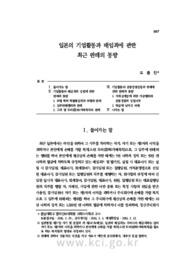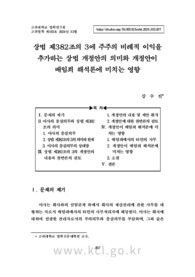

-
미리보기
서지정보
· 발행기관 : 한국비교형사법학회
· 수록지 정보 : 비교형사법연구 / 15권 / 2호 / 261 ~ 282페이지
· 저자명 : 오경식
초록
The business judgement rule states that the director shall not be held liable for any actions or failiure to take action for duties he performed in his office. In Korea the business judgement rule is generally used to remove not only director's civil liability, but also criminal liability such as misfeasance. The latter is misused frequently in our courts. It is questionable whether the business judgement rule should also be the standard of pressing misfeasance charges. With the premised civil legal regulations getting more complex the types of mismanagement are expanding, thus there is a rising necessity for limiting the concept of misfeasance in business judgement rule.
The business judgement rule states that if a director manages in ways he believes to be in the best interest of corporation, as long as this does not involve fraud or other illegal conduct, abuse of discretion, and waste of corporate assets, the management's position is vindicated. Thus when a director completes a duty of care within the standard of conduct, the business judgement rule can be extensively applied as a standard for review. Since the business judgement rule is not yet stated in statute but is established by precedent in the United States, applying it to Korean law should be done by construction.
Since the presumed effect of the business judgement rule is closely connected to the in dubio pro reo rule, which bears the burden of proof on the prosecutor, the business judgement rule can be more useful in the field of criminal law than civil law. When the business judgement rule is extensively acknowledged as a limitation for pressing charges of misfeasance, however, the business judgement rule acts as a judicial restraint, thus protecting the defendant more strongly than in other cases of misfeasance. Therefore criterions for applying the business judgement rule to cases of misfeasance are required.
The contents of the business judgement rule as a limitation in pressing charges of misfeasance can be divided into standards regarding the conditions of the business judgement rule and other related standards. The former standards are the following: breachment of loyalty, duty of care, the circumstances and motives of the business judgement, the contents of business in subject, the economical situation of the corporation, the probability of loss and profit, abuse of discretion, waste of corporate assets, and fraud·illegality·ultra vires conduct(i.e. not being a breach of statutes and public policy, not being a breach of the articles of corporation and statutes). The latter standards are the following: closed status of held corporation, overreaching behaviors, conspiracy, and observation of the policies and directions of confidential experts and government offices and consideration of the director's position. The standards above should act as a handy analysis tool for judging misfeasance according to the business judgement rule.
But the introduction of the business judgement rule, which has been developed as the principle to restrict the liability with fault in America, as a reason for restricting the intentional malfeasance in office targeting on deliberate offense isntead negligence contains many problems. Furthermore, the opinion that adventurous trade does not form malfeasance in office when it is carried out to seek out profit without deviating from the range of execution of common tasks has already been settled in the academia of criminal law that it does not come under the violation of duties. This reduces the necessity of introducing the business judgement rule to criminal law. Seconly, the introduction of the business judgement rule, which has been developed in the special legal and economic situation of America where ownership and administration of company are separate, to Korea, which is still centered on owner-manager, may just be an indiscreet naturalization of foreign plants in ecosystem which does not have any appropriate control system. In particular, it is dubious to accept an incompleted legal principles with indefinite standards that have not yet been stipulated even in America, and is not consistent between academia and court of justice. Thirdly, social role and importance of companies have increased as society professionalized and integrated, but it is still easy to find cases where a company is treated as a possession of one individual, and the awareness of the company's social responsibility is at an insufficient level. So if the business judgement rule is introduced to give indulgence to managers, it will lead to unreasonable results that acknowledge the management as a special social class. Therefore, we must sublate the attitude of unconditionally introducing the business judgement rule to criminal law without serious consideration of our legal situation, and it is desirable to solve the problem of understanding the risk according to the administration of the management with restrictive interpretation theory of the malfeasance in office.영어초록
The business judgement rule states that the director shall not be held liable for any actions or failiure to take action for duties he performed in his office. In Korea the business judgement rule is generally used to remove not only director's civil liability, but also criminal liability such as misfeasance. The latter is misused frequently in our courts. It is questionable whether the business judgement rule should also be the standard of pressing misfeasance charges. With the premised civil legal regulations getting more complex the types of mismanagement are expanding, thus there is a rising necessity for limiting the concept of misfeasance in business judgement rule.
The business judgement rule states that if a director manages in ways he believes to be in the best interest of corporation, as long as this does not involve fraud or other illegal conduct, abuse of discretion, and waste of corporate assets, the management's position is vindicated. Thus when a director completes a duty of care within the standard of conduct, the business judgement rule can be extensively applied as a standard for review. Since the business judgement rule is not yet stated in statute but is established by precedent in the United States, applying it to Korean law should be done by construction.
Since the presumed effect of the business judgement rule is closely connected to the in dubio pro reo rule, which bears the burden of proof on the prosecutor, the business judgement rule can be more useful in the field of criminal law than civil law. When the business judgement rule is extensively acknowledged as a limitation for pressing charges of misfeasance, however, the business judgement rule acts as a judicial restraint, thus protecting the defendant more strongly than in other cases of misfeasance. Therefore criterions for applying the business judgement rule to cases of misfeasance are required.
The contents of the business judgement rule as a limitation in pressing charges of misfeasance can be divided into standards regarding the conditions of the business judgement rule and other related standards. The former standards are the following: breachment of loyalty, duty of care, the circumstances and motives of the business judgement, the contents of business in subject, the economical situation of the corporation, the probability of loss and profit, abuse of discretion, waste of corporate assets, and fraud·illegality·ultra vires conduct(i.e. not being a breach of statutes and public policy, not being a breach of the articles of corporation and statutes). The latter standards are the following: closed status of held corporation, overreaching behaviors, conspiracy, and observation of the policies and directions of confidential experts and government offices and consideration of the director's position. The standards above should act as a handy analysis tool for judging misfeasance according to the business judgement rule.
But the introduction of the business judgement rule, which has been developed as the principle to restrict the liability with fault in America, as a reason for restricting the intentional malfeasance in office targeting on deliberate offense isntead negligence contains many problems. Furthermore, the opinion that adventurous trade does not form malfeasance in office when it is carried out to seek out profit without deviating from the range of execution of common tasks has already been settled in the academia of criminal law that it does not come under the violation of duties. This reduces the necessity of introducing the business judgement rule to criminal law. Seconly, the introduction of the business judgement rule, which has been developed in the special legal and economic situation of America where ownership and administration of company are separate, to Korea, which is still centered on owner-manager, may just be an indiscreet naturalization of foreign plants in ecosystem which does not have any appropriate control system. In particular, it is dubious to accept an incompleted legal principles with indefinite standards that have not yet been stipulated even in America, and is not consistent between academia and court of justice. Thirdly, social role and importance of companies have increased as society professionalized and integrated, but it is still easy to find cases where a company is treated as a possession of one individual, and the awareness of the company's social responsibility is at an insufficient level. So if the business judgement rule is introduced to give indulgence to managers, it will lead to unreasonable results that acknowledge the management as a special social class. Therefore, we must sublate the attitude of unconditionally introducing the business judgement rule to criminal law without serious consideration of our legal situation, and it is desirable to solve the problem of understanding the risk according to the administration of the management with restrictive interpretation theory of the malfeasance in office.참고자료
· 없음태그
-
자주묻는질문의 답변을 확인해 주세요

꼭 알아주세요
-
자료의 정보 및 내용의 진실성에 대하여 해피캠퍼스는 보증하지 않으며, 해당 정보 및 게시물 저작권과 기타 법적 책임은 자료 등록자에게 있습니다.
자료 및 게시물 내용의 불법적 이용, 무단 전재∙배포는 금지되어 있습니다.
저작권침해, 명예훼손 등 분쟁 요소 발견 시 고객센터의 저작권침해 신고센터를 이용해 주시기 바랍니다. -
해피캠퍼스는 구매자와 판매자 모두가 만족하는 서비스가 되도록 노력하고 있으며, 아래의 4가지 자료환불 조건을 꼭 확인해주시기 바랍니다.
파일오류 중복자료 저작권 없음 설명과 실제 내용 불일치 파일의 다운로드가 제대로 되지 않거나 파일형식에 맞는 프로그램으로 정상 작동하지 않는 경우 다른 자료와 70% 이상 내용이 일치하는 경우 (중복임을 확인할 수 있는 근거 필요함) 인터넷의 다른 사이트, 연구기관, 학교, 서적 등의 자료를 도용한 경우 자료의 설명과 실제 자료의 내용이 일치하지 않는 경우
“비교형사법연구”의 다른 논문도 확인해 보세요!
-
기업범죄예방을 위한 내부통제로서 준법지원인제도 30 페이지
Both illegal acts and misconduct of the company have seriously increased in Korea but the internal control system has not been not or was immaturely established, so does not effectively work in compan.. -
중국회사범죄 입법 중 자격형의 보완을 논함 20 페이지
Although the company has been recognized as the subject of criminal responsibility and the bipartite punishment system against corporate crimes has been established in ’s new penal code, the arestillf.. -
회사자본제도 변혁 중의 형법보장 18 페이지
As the amending of the company law in 2005 in China, great changes have taken place in the capital system. This reform is consistent with the international trend about the corporate capital. But it in.. -
중국형법 중 허위출자죄와 출자도피죄에 대한 연구-형법과 회사법의 연결을 겸하여 논함 16 페이지
Based on the modification of the Company Law and the criminal policy of combining punishment with leniency, this paper analyzes the false capital contribution, withdrawing capital crimes in the runnin.. -
법률의 품격-경범죄처벌법에 대한 비판적 제언 30 페이지
The Punishment Of Minor Offenses Act is an extraneous law in Korean law system. The minor offenses, which are against the Punishment Of Minor Offenses Act, is punished sanctions same as criminal law, ..
찾으시던 자료가 아닌가요?
지금 보는 자료와 연관되어 있어요!
문서 초안을 생성해주는 EasyAI







